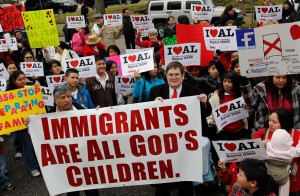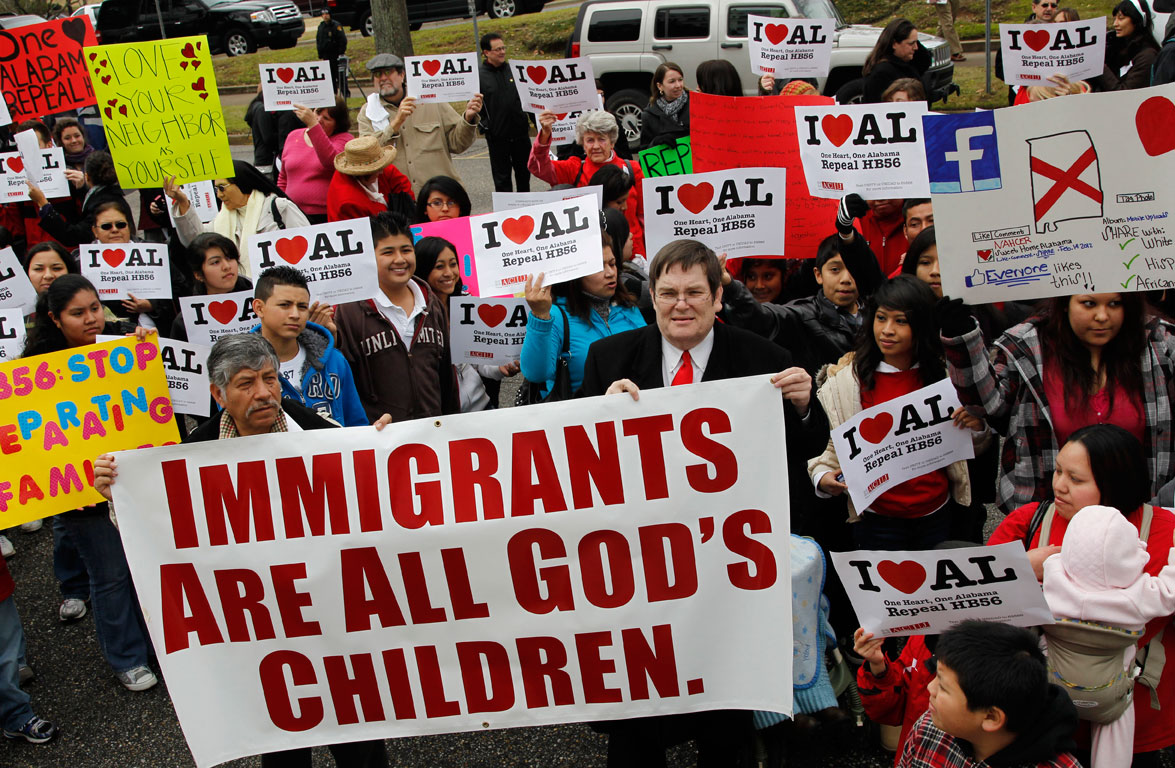 At the web site The Catholic Thing, Brad Miner has written a column on “Why the Catholic Bishops are Wrong on Immigration.” Although claiming to support the goals behind the U.S. Senate’s Gang of Eight immigration proposal, Miner faults the U.S. Catholic bishops for supporting the proposed bill, which he believes will not effectively improve border security and therefore stem the tide of future illegal immigration. Although ready to fault the bishops for their position, Miner, however, as Michael Sean Winters notes at the National Catholic Reporter, “never engages what the bishops have actually taught on this subject.”
At the web site The Catholic Thing, Brad Miner has written a column on “Why the Catholic Bishops are Wrong on Immigration.” Although claiming to support the goals behind the U.S. Senate’s Gang of Eight immigration proposal, Miner faults the U.S. Catholic bishops for supporting the proposed bill, which he believes will not effectively improve border security and therefore stem the tide of future illegal immigration. Although ready to fault the bishops for their position, Miner, however, as Michael Sean Winters notes at the National Catholic Reporter, “never engages what the bishops have actually taught on this subject.”
Instead, Miner raises the old canard that the bishops’ support for immigration hinges on the fact that today’s immigrants are overwhelmingly Catholic. He states quite baldly, “I believe part of the bishops’ advocacy arises from a desire to have these mostly Catholic southern immigrants come bolster demographics in America’s flagging dioceses.” He also notes that Cardinals Francis George, Timothy Dolan, and José Gomez, who have all spoken out on the immigration issue, are pastors of dioceses that receive large numbers of immigrants.
Although the immigrant experience of U.S. Catholics has certainly shaped the approach to the issue taken by today’s church, Miner ignores that what the U.S. bishops have taught mirrors the teaching of the universal magisterium, going back to Popes Pius XII and John XXIII. This teaching is grounded in the dignity of the human person, not in the religious faith of the migrant. Earlier in July Pope Francis himself reiterated this teaching on the Italian island of Lampedusa, the landing point for thousands of primarily Muslim immigrants from North Africa seeking a new life in Europe. That same day Pope Francis posted to his Twitter account, “We pray for a heart which will embrace immigrants. God will judge us upon how we have treated the most needy.” Miner’s stance is also insulting to those who work for the USCCB’s Migration and Refugee Services, Catholic Charities, and other Catholic organizations who faithfully live out the church’s teachings without regard for the religious identity of those they serve.
Miner’s substantive critique, however, seems to be that the bishops are willing to tacitly accept the continuation of high levels of illegal immigration that he believes will result from the Senate bill. He raises two concerns: first, this position represents a dangerous disregard for the law and national sovereignty; and second, although this idea is undeveloped, the bill raises the specter of “unlimited immigration.”
Miner writes, “Far be it from me to deny that God’s sovereignty is paramount in matters of justice. But is national sovereignty un-Christian?” He accuses the U.S. bishops of being “scofflaws” for their failure to insist on the enforcement of immigration law (although he adds that, were the Senate bill to become law, they would cease to be so because their policy preferences would be the law of the land). He also faults the bishops for failing to criticize the Obama administration’s “bald refusal to enforce immigration laws already on the books” (presumably referring to the Deferred Action for Childhood Arrivals policy, since otherwise the number of deportations has been unprecedented under President Obama).
Miner also expresses concern about Cardinal George’s endorsement of “what amounts to unlimited immigration” in his book God in Action. He also notes that President Obama, too, seeks “unlimited immigration.” Although he doesn’t say so explicitly, Miner implies that both support “unlimited illegal immigration.” But this is false, not only because neither Cardinal George (and the U.S. bishops in general) nor President Obama supports unlimited immigration, but also because both favor expanded legal immigration as a way to prevent illegal immigration. In fact, the issue of expanded legal immigration goes completely unmentioned in Miner’s column. For example, although he claims to support the principles originally motivating the Gang of Eight, Miner only mentions “progress toward citizenship” and “secure borders”; he neglects expanded opportunities for legal immigration, which is also a key principle embodied in the expansion of the number of family visas and the new guest worker program proposed in the Senate bill. Ignoring the expansion of legal immigration certainly makes it easier for Miner to dismiss what the bishops have to say, since as he himself admits, “hardly anyone objects to legal immigration,” but really it is key to the church’s teaching.
In the background of Catholic teaching on immigration are two core doctrines. First, the human race makes up a single human family, symbolized by our common origins in Adam (see, for example, the Compendium of the Social Doctrine of the Church, #428). Sin has turned person against person and nation against nation, and therefore this unity is not a lived reality, but nevertheless Catholicism insists that it is fundamental to our nature. Christ, as the New Adam, provides the means for making God’s original plan a lived reality. The second core doctrine is the inherent dignity of the human person, rooted in our creation as the image of God. The dignity of the human person is the foundation of the church’s social teaching, and society exists to promote this dignity.
Now of course there is a lot of ground between the individual person and the human race considered as a whole, and Miner is correct that the nation plays an important role in Catholic teaching. The Second Vatican Council’s Gaudium et Spes states, “The political community exists . . . for the sake of the common good, in which it finds its full justification and significance, and the source of its inherent legitimacy” (#74). But, as Pope John XXIII points out in his encyclical Pacem in Terris, the pursuit of a single nation’s common good includes within itself the recognition that the nation is only part of a larger human family (##85, 98), or part of a universal common good (#113) which consists in the promotion of the dignity of each individual (#139).
The political vision of Catholic social teaching laid out in Pacem in Terris is what political scientists would describe as “cosmopolitan.” Through the principle of subsidiarity (#140), individual nations remain the primary means of bringing about the common good by meeting the needs of their own citizens. However, Catholic teaching recognizes that certain challenges to the common good, such as economic trade and environmental degradation, cross national borders, and therefore agreements between nations and more formal international institutions are also necessary for the sake of the common good. Also, since we live in a system of nations that exists for the sake of the person, special provisions must be made in particular for migrants and refugees, precisely because they are persons whose personal dignity has not been fulfilled in their own nation and therefore fall outside the normal means of promoting the common good. John teaches that, “among man’s personal rights we must include his right to enter a country in which he hopes to be able to provide more fittingly for himself and his dependents” (#106). He adds, “It is therefore the duty of State officials to accept such immigrants and—so far as the good of their own community, rightly understood, permits—to further the aims of those who may wish to become members of a new society.” John here strikes a cosmopolitan balance between the rights of the migrant and the ability of the individual nation to contribute to the common good.
This balance serves as the basis for the U.S. and Mexican bishops’ more detailed teaching in their 2003 document Strangers No Longer, which they summarize with five principles:
- Persons have the right to find opportunities in their homeland;
- Persons have the right to migrate to support themselves and their families;
- Sovereign nations have the right to control their borders;
- Refugees and asylum seekers should be afforded protection;
- The human dignity and human rights of undocumented migrants should be respected (##34-38).
Like Pope John XXIII, while the bishops maintain that a nation has the right to control its borders for the sake of the common good, they insist that the common good must be defined in a way that respects the dignity and rights of each person, and that therefore the presumption is in favor of migrants seeking a new life, particularly for relatively wealthy nations such as the United States (#39).
The U.S. bishops fault the current U.S. immigration system for making it too difficult for the poor, and therefore those with the greatest claim to a right to migrate, to enter the country legally. Although relatively generous in the number of visas offered, U.S. immigration policy is heavily weighted toward those least in need of a new start, in particular the immediate relatives of U.S. citizens and the highly educated. Of course we should admit people in these categories, but we should also provide greater opportunity for those who most need it. The absence of legal avenues for those most in need of them is the primary driver of illegal immigration. Another flaw in the current system is that both family visas and work visas for permanent residence have per country caps, meaning that no more than seven percent of any year’s visas are given to people of any one country, despite the fact that the vast majority of people seeking entry to the United States are from Mexico, Central America, and the Caribbean. The result is that even those who do qualify to immigrate legally are forced to wait ten or more years because there is a mismatch between supply and demand.
In his column, Miner asks, “If a Lutheran Swede needs a visa and a green card on his way to citizenship, why isn’t he the subject of the sort of moral hyperventilating [by the bishops] we hear about the Catholic Mexican?” The answer has nothing to do with religion, but rather that, chances are, the Lutheran Swede will be able to waltz through the U.S. immigration system while most Mexicans are left outside looking in, as a result of differences in education and the per country quota.
Because, according to Catholic teaching, U.S. immigration policy fails to live up to the common good, it is therefore unfair to claim that the U.S. bishops are “scofflaws” for refusing to advocate for greater enforcement against illegal immigration. Miner is correct that civil governance requires respect for the law, but the law must first be just. A just immigration system would provide greater opportunity for legal immigration for those who most need it, and would prove to be the greatest preventive measure against illegal immigration.
Therefore, although the bill is not perfect, the U.S. bishops are right to support the bill proposed in the Senate because it greatly expands the opportunities for legal immigration. Ironically, as I have explained elsewhere, this aspect of the bill, which Miner ignores, will be more effective at preventing illegal immigration than the enforcement measures that he believes the bill fails to make adequate provision for.
Coda: In his column, Miner links to a speech given by Pope Benedict XVI in 2010 on the topic of immigration as support for his focus on national sovereignty, ostensibly as a magisterial counter to the teaching of the U.S. bishops. A close look at the speech, however, shows that it greatly weakens Miner’s case. Benedict certainly does insist on the importance of national sovereignty, but as with both Pope John XXIII and the U.S. bishops, he believes immigration policy should provide a balance between “the recognition of the rights of the person and the principle of national sovereignty” (also not mentioned by Miner is the fact that this balance should be struck by “international organizations, in cooperation among themselves and with the States”!). Benedict insists that a humane immigration policy will include “providing for legal entry,” but more damaging to Miner’s case is that Benedict is much more concrete than either Pope John XXIII or the U.S. bishops on the rights of a sovereign nation to control immigration, namely “with specific reference to the exigencies of security, public order and the control of borders.” Looking at this carefully, “security” obviously refers to the exclusion of terrorists and other enemies of the state, while “public order” is a vague term of law that is intended to exclude people engaged in criminal behavior or gross violations of community moral standards. And then by “the control of borders” Benedict simply means that a nation ought to be able to identify and legally process those entering its territory. Taken at face value, Benedict seems to be saying that while nations have a right to expect immigrants to enter the country legally, the nation only has the right to exclude terrorists, criminals, and the like; this would be a more “open borders” policy than that of any developed nation, and would be roughly equivalent to the policy in the U.S. in the nineteenth century before the first comprehensive immigration regulations were implemented in 1921. In the current U.S. context, the expansion of legal immigration, rather than greater immigration enforcement, would be more likely to fulfill the goals of security, public order, and control of the borders by providing a legal path for the millions of immigrants simply seeking a better life so that government officials could more efficiently focus on apprehending terrorists, drug traffickers, and others who exploit our broken border, and therefore Benedict’s speech serves to reinforce, rather than counter, the teaching of the U.S. bishops.





Trackbacks/Pingbacks